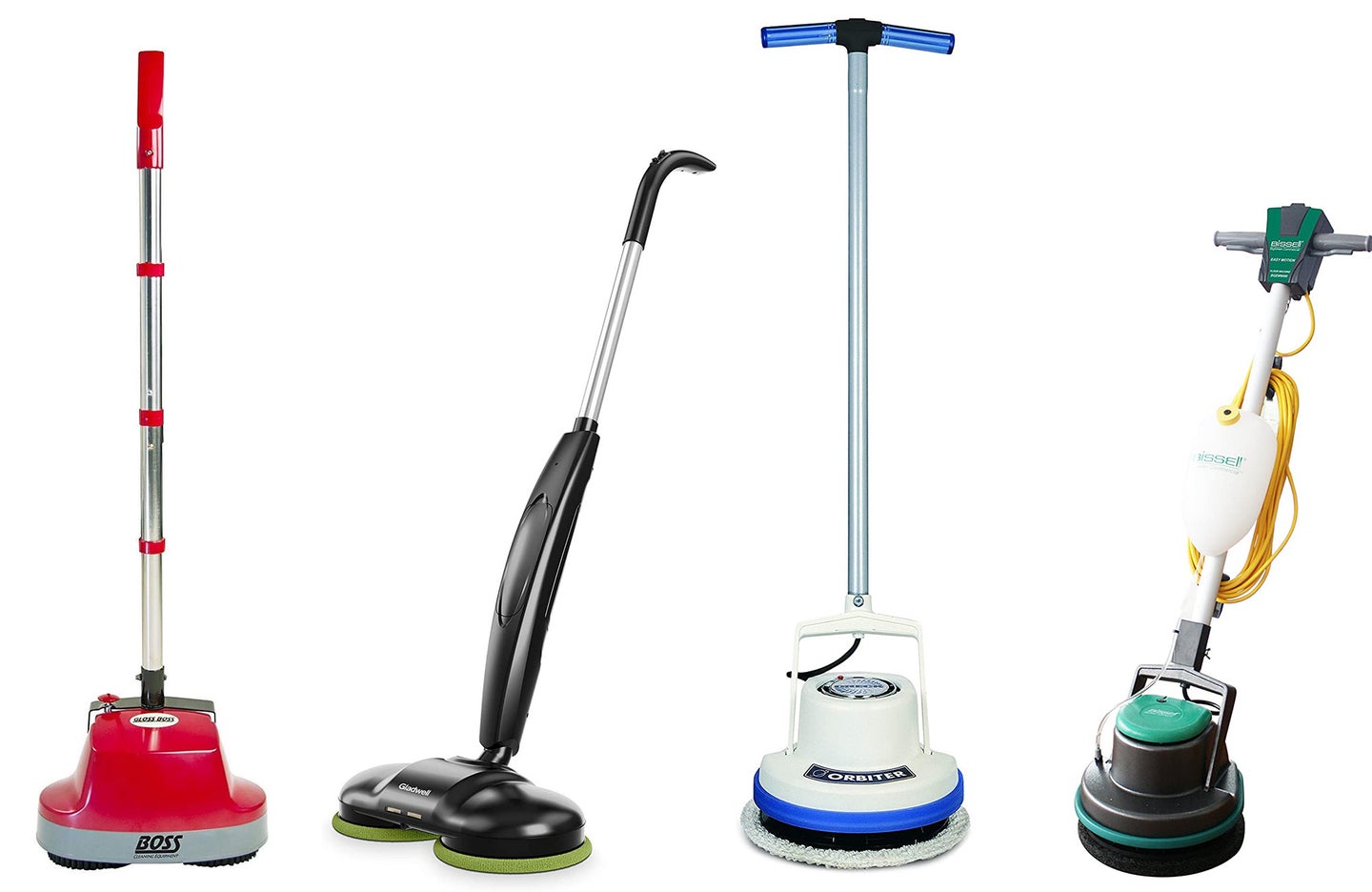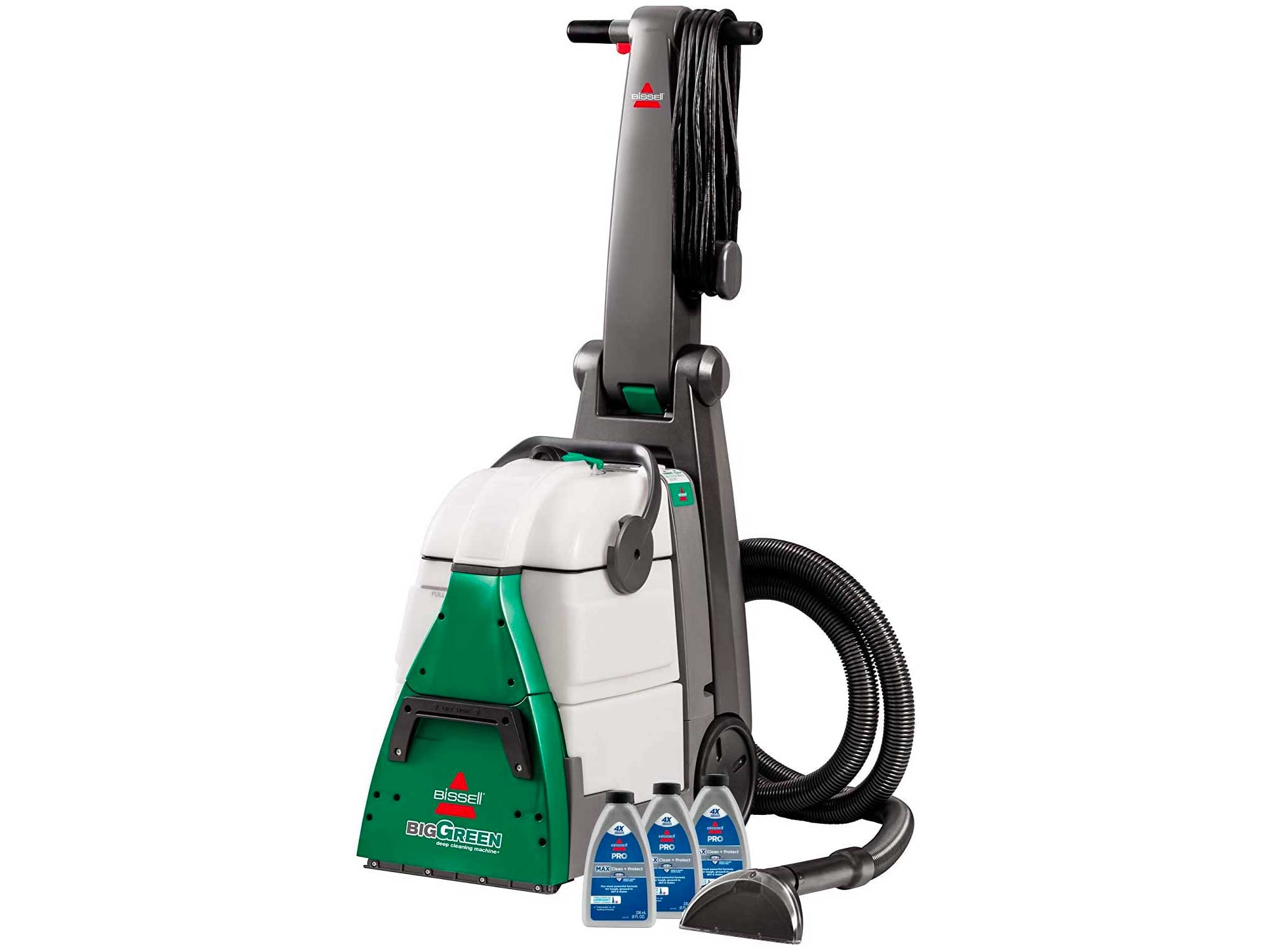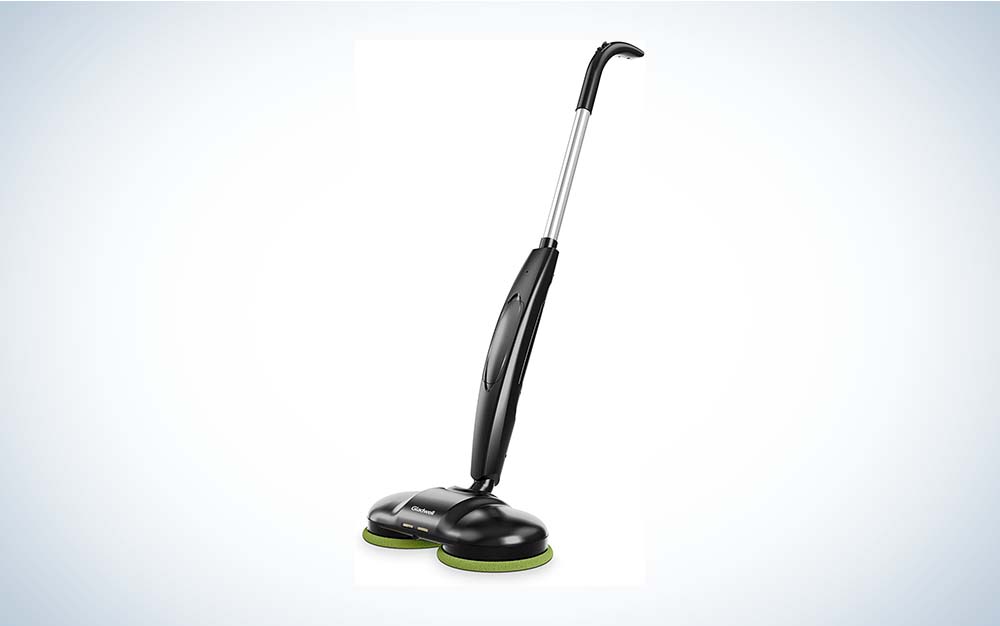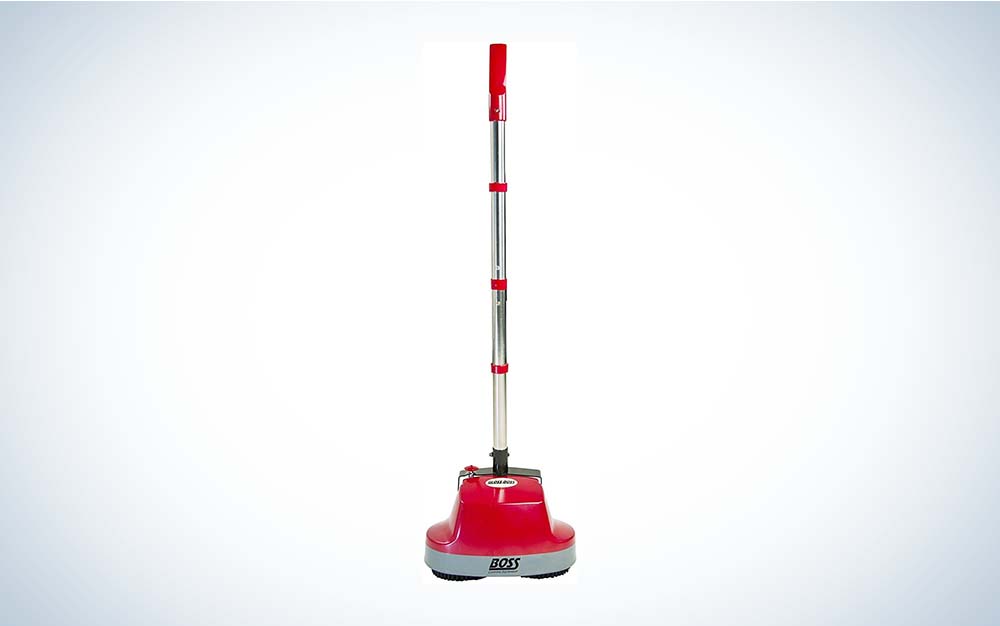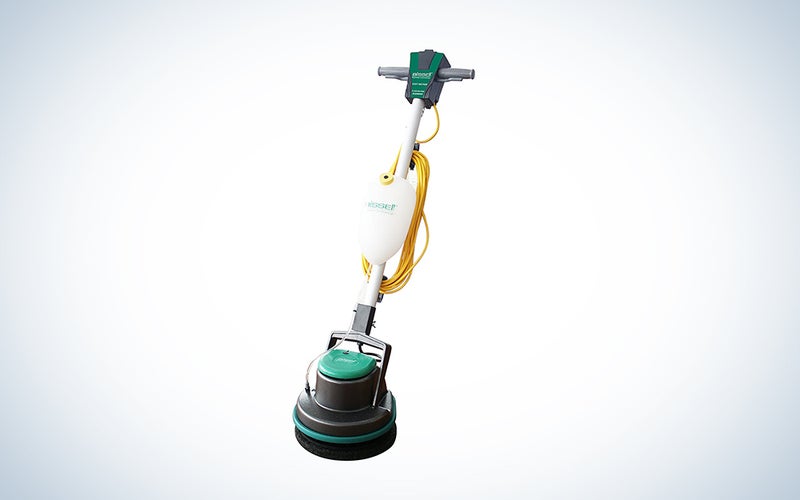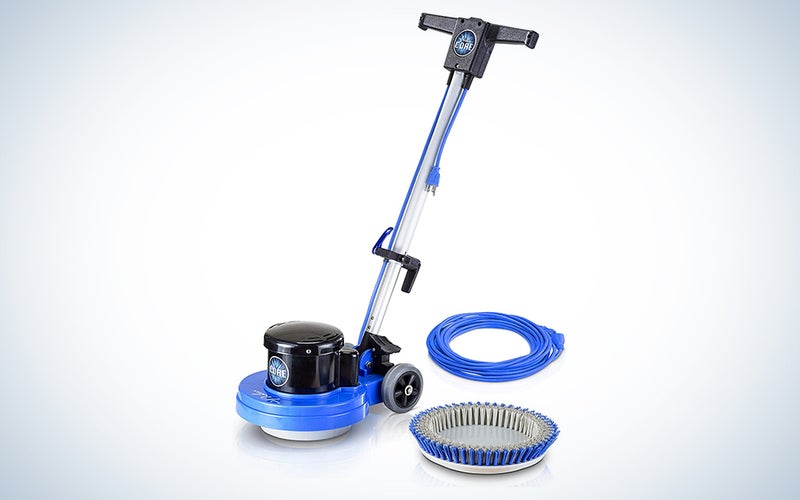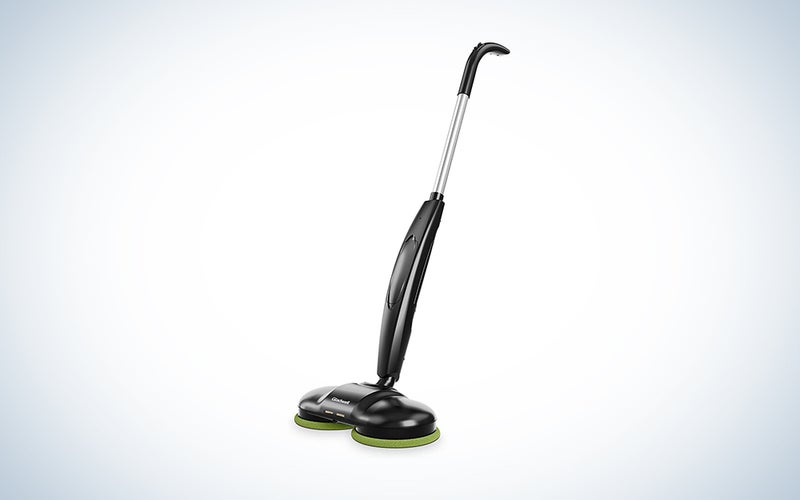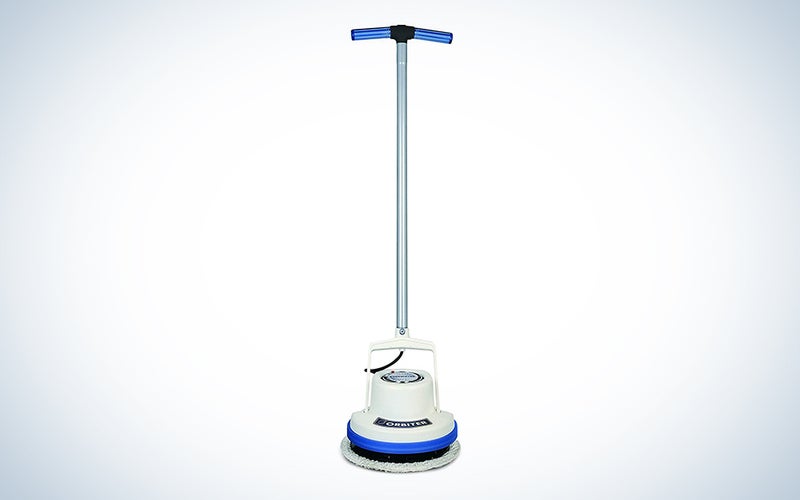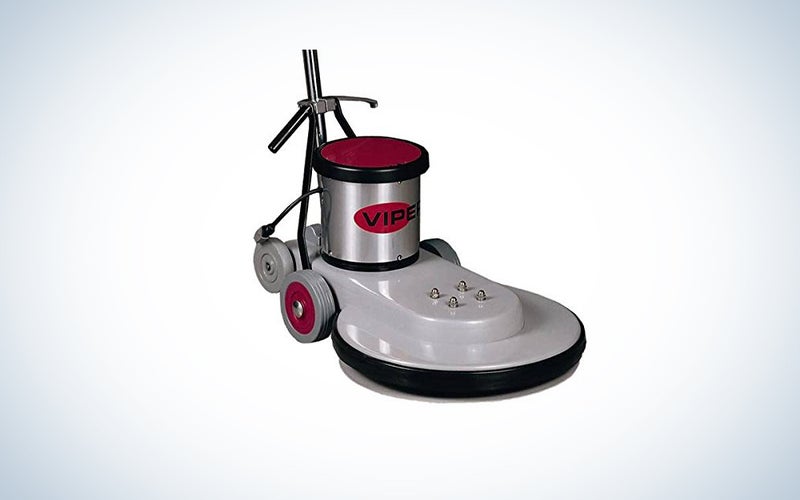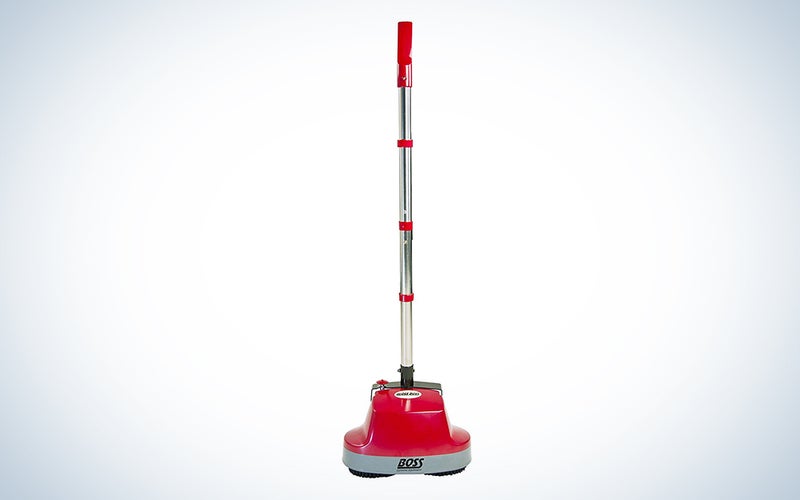We may earn revenue from the products available on this page and participate in affiliate programs. Learn more ›
Cleaning might not be everyone’s idea of “fun” home improvement, but it’s an essential part of the DIY process and a process that a good floor buffer can help. When it comes to floors, if you think about it, they’re the foundation of almost every project. Whether they’re tile, hardwood, or carpet, floors suffer near-constant wear and tear with minimal upkeep—and the occasional Swiffer treatment isn’t quite enough to keep them up to snuff. Your floors deserve some love, and cleaning them with the right equipment is a sure way to guarantee their beauty (and usability) for years to come. If you think the best floor buffers are exclusively for experts, think again—though they are one of the more intimidating pieces of cleaning equipment, with enough research and practice, you’ll be able to operate one of our top picks in no time.
- Best for hardwood floors: Bissell BigGreen Commercial Easy Motion Floor Machine
- Best for tiles: Prolux Core Heavy Duty Commercial Floor Buffer
- Best cordless: Gladwell Cordless 3-in-1 Spinner, Scrubber and Waxer
- Best multi-purpose: Oreck Orbiter Multi-purpose Floor Cleaner
- Best high-speed: Viper Venom Series High-Speed Floor Burnisher
- Best budget: Boss Cleaning Equipment Scrubber
How we chose the best floor buffers
When it comes to your most basic floor cleaning equipment—think brooms and mops, for instance—there’s only so much they can do to rehabilitate your floors. And if they’re in bad shape, having suffered through innumerable trials and tribulations, addressing issues with a surface-level solution isn’t going to cut it.
Say your hardwoods have lost their sheen, or your tile looks impossibly drab; at this point, you might consider calling in the experts. Let us stop you there. Although a professional will leave your floors looking good as new, learning how to do this project yourself has some serious perks, price notwithstanding. Investing in this kind of equipment will set you up for success for years to come—empowering you to reinvigorate your home, one room at a time. Essentially, it’s a one-time cost that will quickly earn its keep. Why rely on the expertise of others when you can reap the benefits of pursuing that knowledge yourself?
Floor buffers are categorized by task—namely buffing, polishing, and waxing—and a few other factors, like speed, floor type, and price. Ahead, we’ve kept these in mind in curating the best floor buffer for almost any home improvement project.
The best floor buffers: Reviews & Recommendations
Whether you’re looking for a heavy-duty machine floor scrubber that can deep clean multiple surfaces in your home or you’re looking for a less-expensive model for spot cleaning, these electric floor cleaners will help you find what you need. Just add a little sweat and the appropriate cleaning solution(s), and you’ll be good to go.
Best for hardwood floors: Bissell BigGreen Commercial Easy Motion Floor Machine
Bissell
Specs
- Weight: 27 pounds
- Power: Corded
- Rotating speed: 175 rpm
Pros
- Powerful
- Removes allergens from carpets
- Can also use on tile, grout, concrete, and brick
Cons
- Some users say they encountered leaking
Anyone with hardwood floors knows they are expensive, and that’s reason enough to want to keep them in good shape for as long as possible. Hardwood floors are subject to constant wear and tear and are often in the highest traffic (aka the most visible) areas of the home, like the living room and dining room. And while there are protective measures you can take during hard floor cleaning, like putting down a large rug, for example, who really wants to cover these beauties up? Instead, we’d recommend keeping your hardwood floors super clean and polished, and if that’s your M.O., you’ll want the best floor buffer machine.
The Bissell floor buffing machine is called Easy Motion for a reason—it’s easy to use (no torque or swirling), and will be tough on dirt and gentle on your hardwoods. Now that’s what we call a win-win. You can also use this multi-purpose device to clean tile, grout, concrete, and brick, and it helps remove allergens from carpets.
Best tile: Prolux Core Heavy Duty Commercial Floor Buffer
Prolux
Specs
- Weight: 28 pounds
- Power: Corded
- Rotating speed: 150 rpm
Pros
- Comes with hard-scrubbing brushes
- Commercial-grade
- Works on concrete, laminate, marble, and gym floors, as well
Cons
- Replacement pads can be hard to find
- Some users found the machine wobbly
Compared to hardwoods, tile is an entirely different beast, and one that you can be a little tougher on. Here, there’s no risk of oversanding; whereas with hardwood, if you sand too aggressively and start uncovering nail heads, you’re on the verge of ruining the wood. Tile, by contrast, is rock hard, and the grout requires a strong hand. Thus, we’d recommend tile floor scrubbers with some serious muscle to leave those floors spick and span.
If you’ve got a seriously dirty job, consider this heavy-duty commercial floor scrubber. It’s small, but it’s the best tile floor scrubber around—and with an extra hard brush, it leaves nothing behind. Additionally, it comes fitted with a random orbit motor, meaning you won’t be left with circular marks all over your floors when you’re done (which might happen if you use a buffer head that only spins in one direction).
Best cordless: Gladwell Cordless 3-in-1 Spinner, Scrubber and Waxer
Gladwell
Specs
- Weight: 11.4 pounds
- Power: Battery
- Rotating speed: N/A
Pros
- Lightweight
- Affordable
- Works on range of surfaces
Cons
- Short battery life
- Some users said it didn’t clean well
The best floor buffers typically have cords and they can be equally annoying and cumbersome. Luckily, like vacuums, a cordless option does exist—and it’s worth checking out if you don’t have easy access to an outlet or if you’re working with lots of square footage that will take some time to traverse. The availability of cordless cleaning tools means you can cover ground without worrying about your power supply—as long as you keep them charged, that is.
The long-lasting battery on this Gladwell cordless floor polisher makes it the perfect match for the shopper who just can’t deal with all those messy cords (we don’t blame you). Plus, it only takes two hours to charge this baby back up. It’s also quite versatile, with multiple settings and functions so that you can use this machine on a variety of floor types.
Best multi-purpose: Oreck Orbiter Multi-Purpose Floor Cleaner
Oreck
Specs
- Weight: 28.1 pounds
- Power: Corded
- Rotating speed: 175 rpm
Pros
- Provides targeted cleaning
- Fast rotation
- Works on multiple surfaces
Cons
- Some users say it didn’t last long
If you’re in the market for a multi-purpose floor buffing machine, it’s important to consider all your floor types’ needs. The best floor scrubber, in this case, will be able to go hard on tile grout and gentle on hardwood floors and maybe even give your carpet a good clean, too. Of course, this level of adaptability will cost you, and prioritizing versatility often means sacrificing particulars in favor of broad strokes. Shopping for the best floor buffer is no different: while you might lose out on some hyper-specific features that only cater to one type of floor or the other, the upside—namely, that one machine can clean an entire home’s worth of flooring—makes the trade-off worth it.
With several different removable pads (available for purchase separately, of course), this Oreck Orbiter floor cleaner is one of the best floor buffers to service virtually any type of surface—including hardwood, tile, concrete, marble, and carpet. It goes without saying that having to purchase more gear separately isn’t ideal, but once you own this electric floor scrubber, you have the foundational tool to tackle almost any job.
Best high-speed: Viper Venom Series High Speed Floor Burnisher
Viper
Specs
- Weight: 101 pounds
- Power: Corded
- Rotating speed: 175 rpm
Pros
- Durable
- Designed for industrial projects
- Powerful
Cons
- Not designed for lighter jobs
- Expensive
This Viper Venom is a beast of a floor polisher machine, weighing in at 101 pounds of pure metal. It’ll last a lifetime (or somewhere near there), but keep in mind that this is really only for serious industrial projects and isn’t the right piece of equipment for your kid’s playroom or your living room floor. For another cleaning option, check out our guide to the best vacuum-mop combos.
Best budget: Boss Cleaning Equipment Scrubber
Boss
Specs
- Weight: 70 pounds
- Power: Corded
- Rotating speed: 470 rpm
Pros
- Inexpensive
- Super fast rotating speed
- Lightweight
Cons
- Not as powerful as other models
At one-tenth the price of the most expensive floor buffer on our list, the Boss Cleaning Scrubber wins most affordable cleaning tool by a mile. It’s not cordless or of industrial-strength, but it is very lightweight (seven pounds, to be exact), and works on a variety of different floors. Bonus: it includes two washable microfiber pads, so you can take this out of the box and get straight to work floor polishing.
Things to consider when shopping for the best floor buffers
Purchasing a floor buffer is an investment. Weighing a range of factors will help you find the best option for you and your home.
Type of flooring
If your home is filled with beautiful hardwood floors, a device that’s designed to go easy on them, such as the Bissell BigGreen Commercial Easy Motion Floor Machine, might be a good option. Most homes contain a range of floor types, including hardwood and tile, however. In that case, you may want to consider a multi-purpose option, such as the Oreck Orbiter Multi-Purpose Floor Cleaner, which can buff a range of flooring types.
Speed
There are three things you should know about purchasing a high-speed floor buffing machine. One: they provide a deeper clean, because the buffer is moving at a much faster speed than your typical 175 rpm, or revolutions per minute. Two: because of that, you probably don’t want to use this floor polisher on hardwoods, because a buffer moving that fast will quickly sand down the wood, and subsequently ruin it. Three: they’re much more expensive than their low-speed counterparts.
With these three points in mind, you might be wondering when, if ever, you should consider purchasing a high-speed floor-polisher machine. These floor buffers are best when you need to totally strip your floors, when you need to scrub and polish a lot of square footage (and you want to do it fast), or when you’re rehabbing some really dirty, really hard flooring, like garage floor concrete, for instance. If your next DIY project fits the bill, consider the Viper Venom Series High-Speed Floor Burnisher.
Power
If you’re looking to tackle an industrial job, you’ll need a powerful machine. The Viper Venom Series High Speed Floor Burnisher is designed with a high-speed rotation of 175 rpm. At 101 pounds, it’s not a machine you can easily transport from room to room. But if you want a buffer that’s multipurpose and can easily be transported, the Gladwell Cordless 3-in-1 Spinner, Scrubber and Waxer might be a better choice.
Price
As you’ve probably noticed, floor buffers are notoriously expensive and really only worth the cost if you’ve got a laundry list of DIY projects (and square footage) to tackle in the near future. If you live in an apartment or a small space, investing in a $1,000 floor cleaner machine probably isn’t the move. That said, there are options for the budget-conscious among us, and keeping your floors shiny and looking like new shouldn’t be limited to those who happen to live in a large space.
When you’re shopping for a floor buffer on a budget, it’s inevitable that you will miss out on the latest and greatest tech advances—and, thus, you might not get the deepest clean. However, sometimes affordability wins out over precision, and that’s perfectly ok.
FAQs
Q: How much does a floor buffer cost?
A floor buffer ranges from about $1,000 for the Viper Venom Series High-Speed Floor Burnisher, which is designed for industrial jobs, to less than $100 for the lightweight Boss Cleaning Equipment Scrubber.
Q: How often should floors be buffed?
How often floors should be buffed depends largely on two factors—the amount of foot traffic on the floor and how often you’re using other cleaning methods, like a mop or Swiffer. If there are a ton of people coming and going over the floor, you might consider buffing once a week or once a month. If there’s low foot traffic, three or four times a year should be sufficient.
Q: Can you use a buffer on hardwood floors?
You can absolutely use a buffer on hardwood floors. Just ensure the manufacturer’s instructions for your cleaning tool of choice say it’s appropriate for hardwood. If it’s not, it could further scratch the surface of the wood while you’re cleaning and do more harm than good. Hardwood floors should be buffed to extend their lifespan (which will save you a lot of money in the long run).
Q: What is the difference between buffing and polishing a floor?
The difference between buffing and polishing a floor is in the tools and, thus, the resulting finish. While buffing uses a cloth wheel and creates a bright finish, polishing is more abrasive (and thus more precise) and makes for an even shinier finish. Obviously, they’re quite similar, and in some product descriptions, you might see them used interchangeably.
Final thoughts on shopping for the best floor buffer
- Best for hardwood floors: Bissell BigGreen Commercial Easy Motion Floor Machine
- Best for tiles: Prolux Core Heavy Duty Commercial Floor Buffer
- Best cordless: Gladwell Cordless 3-in-1 Spinner, Scrubber and Waxer
- Best multi-purpose: Oreck Orbiter Multi-Purpose Floor Cleaner
- Best high-speed: Viper Venom Series High-Speed Floor Burnisher
- Best budget: Boss Cleaning Equipment Scrubber
Shopping for the best floor buffer for your needs can be intimidating and, if you’re prone to sticker shock, discouraging. But, equipped with knowledge and predetermined preferences, you can find exactly what you’re looking for—without breaking the bank. If home improvement projects are in your future, consider adding a floor buffer to your arsenal of cleaning tools. Your floors will thank you.
Why trust us
Popular Science started writing about technology more than 150 years ago. There was no such thing as “gadget writing” when we published our first issue in 1872, but if there was, our mission to demystify the world of innovation for everyday readers means we would have been all over it. Here in the present, PopSci is fully committed to helping readers navigate the increasingly intimidating array of devices on the market right now.
Our writers and editors have combined decades of experience covering and reviewing consumer electronics. We each have our own obsessive specialties—from high-end audio to video games to cameras and beyond—but when we’re reviewing devices outside of our immediate wheelhouses, we do our best to seek out trustworthy voices and opinions to help guide people to the very best recommendations. We know we don’t know everything, but we’re excited to live through the analysis paralysis that internet shopping can spur so readers don’t have to.
